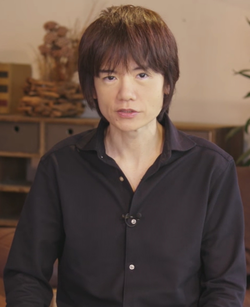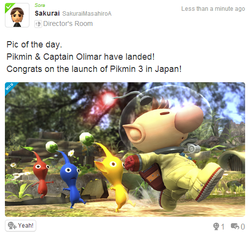Masahiro Sakurai: Difference between revisions
(Undid edit by MasahiroSakurai3: ) |
(→Trivia) |
||
| Line 63: | Line 63: | ||
==Trivia== | ==Trivia== | ||
*Sakurai provided voice acting for [[King Dedede]] in ''{{s|wikirby|Kirby 64: The Crystal Shards}}'', ''[[Super Smash Bros. Brawl]]'', and ''[[Super Smash Bros. 4|Super Smash Bros. for 3DS and Wii U]]''.<ref name="Dedede">{{cite web |url=http://www.smashbros.com/wii/en_us/gamemode/various/various38.html |title=Smash Bros. DOJO!!: Smash Trivia |accessdate=2010-11-17 |date=2008-04-14 |publisher=Nintendo |quote=Brawl’s director, Masahiro Sakurai, provided the voice for King Dedede.}}</ref>. | *Sakurai provided voice acting for [[King Dedede]] in ''{{s|wikirby|Kirby 64: The Crystal Shards}}'', ''[[Super Smash Bros. Brawl]]'', and ''[[Super Smash Bros. 4|Super Smash Bros. for 3DS and Wii U]]''.<ref name="Dedede">{{cite web |url=http://www.smashbros.com/wii/en_us/gamemode/various/various38.html |title=Smash Bros. DOJO!!: Smash Trivia |accessdate=2010-11-17 |date=2008-04-14 |publisher=Nintendo |quote=Brawl’s director, Masahiro Sakurai, provided the voice for King Dedede.}}</ref>. | ||
*Sakurai's wife, Michiko Sakurai (née Michiko Takahashi), worked on the user interface for many of his games, including | *Sakurai's wife, Michiko Sakurai (née Michiko Takahashi), worked on the user interface for many of his games, including ''Meteos'', ''Kid Icarus: Uprising'', and the ''Super Smash Bros.'' series<ref>http://kyoto-report.wikidot.com/michiko-sakurai</ref>. In the original ''Super Smash Bros.'', she additionally designed the [[Title screen|title]] and [[Character selection screen|character selection]] screens, as well as the [[Peach's Castle]], {{SSB|Mushroom Kingdom}}, and {{SSB|Yoshi's Island}} stages<ref>http://themushroomkingdom.net/ssb_credits-full.shtml</ref>. | ||
==See also== | ==See also== | ||
Revision as of 20:17, March 26, 2018
| Masahiro Sakurai
桜井政博 | |||
|---|---|---|---|
 Masahiro Sakurai | |||
| Born | |||
| Occupation | Video game director, game designer, founder of Sora Ltd. | ||
| Spouse | Michiko Sakurai | ||
Masahiro Sakurai 桜井政博, born August 3, 1970, is a Japanese game developer, creator, writer, and voice actor. His most notable creations as a game developer include the Kirby and Super Smash Bros. series, both of which he created and developed in his tenure with HAL Laboratory, a Nintendo subsidiary. He has continued his work on the Super Smash Bros. series under Sora Ltd., a company that he formed after his departure from HAL Laboratory in 2003.
Biography
At Nintendo and HAL Laboratory
One of Sakurai's earliest experiences in the video game industry began when he worked for HAL Laboratory, Inc. It is there that he created the character Kirby at the age of 19. He would soon direct his first title, Kirby's Dream Land.
Sakurai first came up with the concept for Super Smash Bros. in 1998; the original idea consisted of a fighting game with different mechanics than standard fighters. Known as Dragon King: The Fighting Game, the project was intended for release on the Nintendo 64. However, Sakurai decided that the inclusion of Nintendo characters would give the game a more proper atmosphere compared to before. The end product, Super Smash Bros., became an unexpected hit, eventually becoming one of the best-selling Nintendo 64 games.
With the upcoming release of the Nintendo GameCube, Sakurai was named head of production for the development of Super Smash Bros. Melee, once again with HAL Laboratory. He recalls living a "destructive lifestyle" during the game's 13-month development period, with no holidays and short weekends.[1] In addition to his work in developing the game, Sakurai also wrote and maintained the site Smabura-Ken, a website devoted to revealing the multiple gameplay elements of Melee.
Super Smash Bros. Melee was released in late 2001. It surpassed the popularity of its predecessor, and Melee eventually became the GameCube's highest-selling game of all time; reception to the game was also positive, with some publications even considering it among HAL Laboratory's finest works.
Resignation from HAL Laboratory
Sakurai resigned from his position at HAL Laboratory on August 5, 2003, shortly after the release of Kirby Air Ride. Sakurai was highly critical of the circumstances surrounding the game, claiming that he had become tired of the gaming industry's growing focuses on sequels:
- "It was tough for me to see that every time I made a new game, people automatically assumed that a sequel was coming," said Masahiro Sakurai on August 26, 2003, in an interview with Nintendo Dream, two weeks after his resignation from HAL Laboratory. "Even if it's a sequel, lots of people have to give their all to make a game, but some people think the sequel process happens naturally."
The future of both the Kirby and Super Smash Bros. franchises were in jeopardy following his resignation. Sakurai later stated that he wished for HAL to continue working on the Kirby series, but the future of Super Smash Bros. was still unknown.
After his departure with HAL in August 2003, Sakurai began working with Q Entertainment, along with Tetsuya Mizuguchi. This collaboration resulted in Meteos, a unique puzzle game for the Nintendo DS.
Sakurai also became an author for the weekly columns of Famitsu Weekly, a Japanese gaming-themed magazine.
Sora Ltd. and Super Smash Bros. Brawl
On September 30, 2005, Sakurai announced that he had formed his own company, Sora Ltd. As for the future of the Super Smash Bros. series, former HAL Laboratory President and former President of Nintendo, Satoru Iwata, during the Nintendo E3 2005 press conference, promised an online iteration of the game would come to their latest video game console, the Nintendo Wii. In issue #885 of Famitsu magazine, Sakurai first revealed that he would be serving as a director and game designer on Nintendo's highly anticipated Super Smash Bros. Brawl. Sakurai developed the game alongside personnel borrowed from Game Arts.
Like Melee, Sakurai maintained a site devoted to Brawl's gameplay developments, called the Smash Bros. DOJO!!. Unlike Smabura-ken, which was written only in Japanese, the website was made available in multiple languages.
Brawl was released in early 2008. It became one of the Wii's highest-selling games and received high critical reception like Melee, its predecessor.
Kid Icarus: Uprising and Super Smash Bros. 4
Following the release of Brawl, Sakurai and Satoru Iwata formed a Nintendo subsidiary called Project Sora for the purpose of developing the first new entry in the Kid Icarus series in 21 years. Titled Kid Icarus: Uprising, the game featured 3-D flying on-rails shooting segments as well as 3rd-person action sequences on the ground, a great departure from the 2-D action the first two Kid Icarus games provided. At E3 2011, Iwata announced that Sakurai would be working on the next installment of Super Smash Bros. for the Wii U and 3DS once his team was complete with the development of Kid Icarus: Uprising.
After the team at Project Sora disbanded, Sakurai began development[2] for the new Smash games with Bandai Namco on February 21, 2012. He announced that wanted the 3DS version to be more of an "individual" and "customizable" experience where, hypothetically, the player could take a customized character and upload it to the Wii U version.[3]
Like Melee and Brawl, Sakurai developed a site devoted to the new game, however information about the game was shown through photos rather than text. From June 11th, 2013 until December 4th, 2014, Sakurai began posting a "Pic of the Day" every weekday in the the new Director's Room community on Miiverse. These photos were additionally posted on the official website and linked to the original Miiverse posts.
Sakurai developed calcific tendonitis near his right shoulder in February of 2013, which causes pain during arm movement. Sakurai mentioned that this could substantially slow down his current work, as he does some game testing himself.[4]
Following the release of Super Smash Bros. for 3DS and Wii U, Sakurai began developing downloadable content with a smaller team at Bandai Namco. The sixth and final wave of downloadable content was released on February 3rd, 2016.
Super Smash Bros. for Nintendo Switch
Super Smash Bros. for Nintendo Switch was announced on March 8th, 2018 via a Nintendo Direct. Shortly after, Sakurai confirmed that he had been working on the game "in silence day after day".[5][6] However, it is currently unknown if he is returning as the director or has another role, such as a producer or supervisor.
Trivia
- Sakurai provided voice acting for King Dedede in Kirby 64: The Crystal Shards, Super Smash Bros. Brawl, and Super Smash Bros. for 3DS and Wii U.[7].
- Sakurai's wife, Michiko Sakurai (née Michiko Takahashi), worked on the user interface for many of his games, including Meteos, Kid Icarus: Uprising, and the Super Smash Bros. series[8]. In the original Super Smash Bros., she additionally designed the title and character selection screens, as well as the Peach's Castle, Mushroom Kingdom, and Yoshi's Island stages[9].
See also
External links
References
- ^ George, Richard. Super Smash Bros Creator: "Melee The Sharpest". IGN.
- ^ http://www.cubed3.com/news/16506?
- ^ Gantayat, Anoop (2012-06-09). Iwata Asks About Smash Bros.. Andriasang. Retrieved on 2012-06-10.
- ^ Gifford, Kevin. Why Masahiro Sakurai's bum right arm is hindering work on the new Smash Bros.. Polygon.com. Retrieved on 2013-04-19.
- ^ Sakurai announces that he has been working on Smash for Switch.
- ^ Translation of Sakurai's Smash for Switch tweet.
- ^ Smash Bros. DOJO!!: Smash Trivia. Nintendo (2008-04-14). Retrieved on 2010-11-17. “Brawl’s director, Masahiro Sakurai, provided the voice for King Dedede.”
- ^ http://kyoto-report.wikidot.com/michiko-sakurai
- ^ http://themushroomkingdom.net/ssb_credits-full.shtml

